
I'm not interested in laying blame on anyone for the filibuster or it's selective demise.
But I am *very* interested in Bryan's first point about the filibuster and constitutional design. A few quick thoughts . . .
But I am *very* interested in Bryan's first point about the filibuster and constitutional design. A few quick thoughts . . .
https://twitter.com/BryanGividen/status/1352625591112130560
First, I'm generally a fan of not having legislatures pass too many laws. Especially in my filed--criminal law--an active legislature often means more punishment and less liberty.
But in modern times less active legislature doesn't necessarily mean fewer laws or more liberty.
But in modern times less active legislature doesn't necessarily mean fewer laws or more liberty.
Because it is so hard for legislatures to act, we see Congress and the states delegating a lot to agencies and executive officials. It's very easy for those institutions to act. And the harder it is for legislatures to act, the more it incentivizes and normalizes delegations.
It's even common for Congress to just throw a question to an agency because they aren't able to compromise. That what we saw happen with SORNA--the delegation that was challenged in the Gundy case.
Congress couldn't agree so they delegated to DOJ.
Congress couldn't agree so they delegated to DOJ.
Unsurprisingly, when Congress let DOJ choose what the criminal law would look like, they chose the most expansive and prosecution-friendly regulation. I mean, who'd of thought that the prosecutors would write themselves the most pro-prosecution rule? 🤷♀️
To be clear, it isn't just the filibuster that makes legislatures so inactive. There's also the practice of letting leadership set the legislative agenda. If the majority leader in the Senate doesn't want a piece of legislation to get a vote, then it just doesn't.
That's not just an issue with legislation. It also matters for nominations. That's why Merrick Garland didn't even get an up-or-down vote in the Senate: Because Mitch McConnell didn't want him to.
That congressional leadership can control what gets a vote is a real problem when it comes to democratic accountability. As @AndyHessick and I explained in this @ArcDigi essay, it keeps voters from knowing what their representatives stand for. arcdigital.media/americas-battl… 



Now, I imagine that some people would say that the filibuster and agenda setting are good things because they keep the Senate from becoming too majoritarian. Maybe they'd even quote Madison and talk about the evils of factions.
The thing is, Madison didn't think that factions were only a problem that is associated with majoritarian politics. He also explained that factions can represent a minority. He was just less concerned about minority factions because he thought democracy would defeat them.
But the filibuster and agenda setting seem like they entrench minority factions. They certainly exacerbate the non-democratic nature of the Senate, and unlike the equal representation of states, they aren't required by the Constitution and they don't promote federalism.
And yes, I know that a majority of the Senators could vote to do away with these rules. But we should really consider whether there are self-interests that incentivize Senators to keep these features even though it makes their constituents worse off.
In any event, I find myself inclined to agree with @BryanGividen that the filibuster is not consistent with constitutional design.
And in the off chance you're interested in my worries about delegation and criminal law, here's more on that topic: papers.ssrn.com/sol3/papers.cf…
And in the off chance you're interested in my worries about delegation and criminal law, here's more on that topic: papers.ssrn.com/sol3/papers.cf…
• • •
Missing some Tweet in this thread? You can try to
force a refresh



